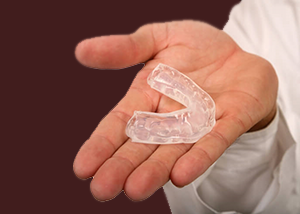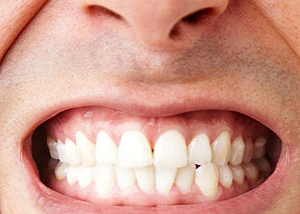Wearing a Mouth Guard
A mouth guard can help protect your teeth from damage due to grinding. Because many people need to wear one at night, a mouth guard is sometimes called a night guard. The guard is custom-made out of plastic. It may fit over your top or bottom teeth. Wear your mouth guard exactly as your dentist instructs. Also, be sure to care for your mouth guard properly.
Mouth Guard Care

- Rinse the guard before wearing it and after removing it from your mouth.
- Brush it gently with a toothbrush and toothpaste or liquid soap after removing it.
- Soak the guard in water when you’re not wearing it, unless told otherwise.
- Soak the guard in denture cleaner every so often to help keep it fresh.
- Check your guard for signs of wear. Show it to your dentist at each checkup. Mouth guards may wear down and need to be repaired or replaced.
Protect Your Smile
Getting teeth grinding under control can help you sleep better at night and feel better during the day. It can also help you protect your smile by keeping your teeth from being damaged.
Do You Grind Your Teeth?
Many people grind or clench their teeth. Are you one of them? Although teeth grinding (bruxism) may happen at any time, people often grind their teeth in their sleep. You may not even know you’re doing it. The causes are not clear. Stress is one possible cause, but often the reason for the habit is not known.
Teeth grinding may cause:
- Chipped enamel
- Flattened, grooved, worn-down teeth
- Loosened teeth
- Cracked teeth
If something isn’t done to stop the damage, bruxism may lead to jaw muscle or joint problems and even loss of your teeth.
Experience Teeth Grinding? Call us Today! (510) 644-0701.
 The Symptoms of Grinding
The Symptoms of Grinding
Your dentist may ask whether you have certain symptoms such as:
- A sore, tired jaw
- Dull headaches
- Earaches
- Sensitive teeth
Symptoms like these may be a signal that you grind your teeth.
Possible Treatments
You and your dentist can decide how best to treat your teeth-grinding problem. The most common treatments are listed below.
Mouth Guards
A mouth guard is a plastic device that fits over your teeth. It protects them from grinding damage. A mouth guard is worn at the times when you’re most likely to grind your teeth.
Stress Reduction
Stress is suspected in many cases of bruxism. Reducing stress may help relax your jaw muscles and make grinding less likely. Your dentist may suggest regular exercise or other ways to reduce stress.
Medication
In some cases medication may be given. It may help relieve sore muscles or reduce stress.
Fixing Damaged Teeth
Your dentist can discuss ways to fix teeth damaged by bruxism. Crowns and inlays are two ways to fix damaged teeth.
Evaluating the Problem
To decide how best to help you, your dentist will inspect your teeth and ask questions. This evaluation helps confirm that you do grind your teeth. It may also help identify a possible cause of your teeth-grinding habit.
